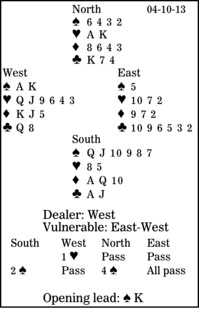Bridge column, April 10: A third overcall changes its meaning

At the bridge table, though, sometimes you must jump and trust the theoreticians.
Today we will look at the third bid that changes its meaning in the balancing position. If the dealer opens one of a suit and the next player makes a single jump overcall in a different suit, it is weak. However, if the opening bid is followed by two passes, a single jump overcall in the pass-out seat is intermediate, promising a good six-card suit and 14 to 16 high-card points. South's two-spade jump overcall in this deal is textbook.
After North raises to four spades, West leads the spade king, cashes the spade ace, and exits with a heart to dummy's king. How should South continue?
At first glance, declarer needs one of the two diamond finesses to work. But the contract is guaranteed with an elimination and endplay. South plays a club to his ace, overtakes the club jack with dummy's king, ruffs the last club in his hand, and returns to the board with a heart.
With trumps drawn and both red suits eliminated, declarer plays a diamond to his 10. West wins with the jack but is endplayed. If he returns a diamond, it is away from the king into South's ace-queen. Or if West leads a heart, declarer ruffs on the board and sluffs his diamond queen.
** ** **
COPYRIGHT: 2013, UNITED FEATURE SYNDICATE
DISTRIBUTED BY UNIVERSAL UCLICK FOR UFS

